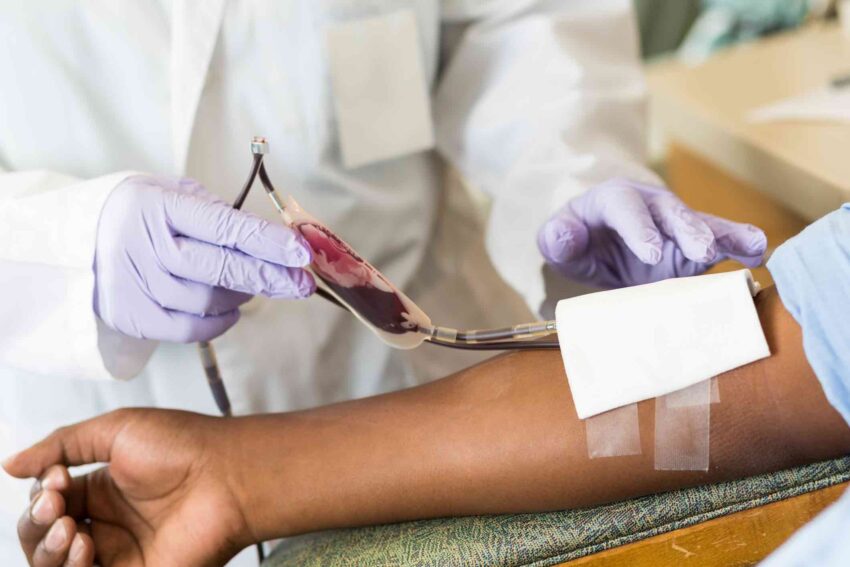A LANDMARK move which allows men who have sex with men in long term relationships to donate blood in England – makes blood donation rules for visitors to Black African countries seem outdated in comparison.
The NHS has made repeated calls for more Black donors to come forward because they are more likely to have rare blood types.
However, if you have returned from Ghana, Angola and Cameroon you have to wait at least four months before you can donate.
If you are returning from Uganda, Nigeria or Sierra Leone you have to wait at least 6 months to give blood.
However, if you are returning from Eygpt, Morocco and some parts of Turkey you can donate upon return. These rules apply even if you had no sex during your trip abroad, and show a negative HIV test result.
People also cannot donate blood if a recent sexual partner may have been sexually active in parts of the world where HIV or Aids is common, including “most countries in Africa.”
The NHS Blood and Transplant service have previously suggested the need for “a detailed review of this policy” and stated that “a more individualised risk assessment approach” could allow more people to donate safely.
Landmark change
Allowing men who have sex with men in long term relationships sees the UK become one of the first countries in the world to adopt a more individualised risk-based approach to donor selection criteria.
All blood donors who have had one sexual partner and who have been with their sexual partner for more than three months will now be eligible to donate regardless of their gender, the gender of their partner, or the type of sex they have.
The changes will also take place in each of the devolved administrations, and will come into force by summer 2021.
Deborah Gold, Chief Executive at National AIDS Trust, welcomed the move and said: “We now need to see action on the endemic health inequalities that lead to the disproportionate impact of HIV on some groups including gay and bisexual men and people from Black African communities.
“This includes the government meeting its commitment to end new HIV transmissions by 2030 and implementing the findings of the HIV Commission, which set out how this can be achieved.”
Su Brailsford, associate medical director at NHS Blood and Transplant said: “We are proud to have the safest blood supply in the world and I’m pleased to have concluded that these new changes to donor selection will keep blood just as safe.
“We welcome this decision by government to accept the recommendations made by For The Assessment of Individualised Risk (FAIR) in full. We will keep collaborating with and listening to LGBT representatives, patients and current donors to make sure by Summer 2021, when we bring about these changes, that our process for getting accurate information from donors about their sexual behaviours is inclusive and done well.
“This is just the beginning of a more individualised way of assessing blood donation eligibility and we recognise that more work needs to be done, which is why FAIR has also made a recommendation to government that further evidence-based reviews are needed for other deferrals such as how we determine risk based on travel.”


Comments Form
1 Comment
This is allowing Political Correct senstivities to over-ride science and public safety and this need to be rejected.
Because of Political Correctness, the advice that Monkeypox is primarily spread in Europe by men having “anal sex with strangers” according to the U.S. CDC and the World Health Organisation has been watered down for Political Correct reasons.
The Monkeypox outbreak in Europe has been traced to Gay Celebration gatherings in Belgium and Spain. The events attracted thoudands of people.
With Political Correctness severely restricting the ability of Public Servants to communicate and exchange ideas, how can Medical Authorities and Public Postholders communicate the dangers of Monkey Pox infection is increased significantly by men having “anal sex” with complete strangers?
This is a Public Health Message that needs to be communicated to England’s homosexual men-specifically during Gay Pride celebrations.
However, because identifying homosexual men is no longer politically acceptable, the dangers of “anal-sex with strangers” that has been identified as the cause of Europe’s Monkeypox outbreak has been water down to the degree that the important message has become lost; unclear and diffused.
Political Correctness must not be permitted to triumph over clearly and accurately stated Public Health Messages.
Blood should not be taken or used from men who engage in homosexual practices.